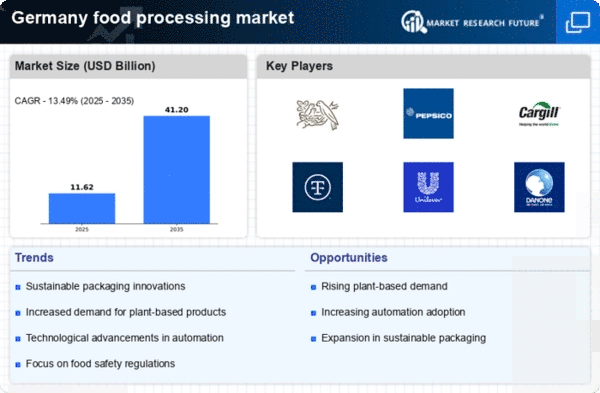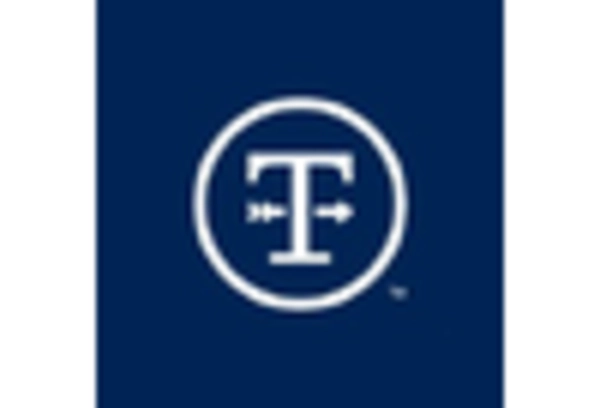Growth of Plant-Based Products
The food processing market in Germany is witnessing a significant shift towards plant-based products, driven by changing dietary preferences and increased awareness of health and environmental issues. Recent statistics indicate that the plant-based food sector is expected to grow by 10% annually, reflecting a growing consumer base that prioritizes sustainability and health. This trend is prompting food processing companies to innovate and diversify their product lines, incorporating plant-based ingredients into traditional offerings. The rise of veganism and flexitarian diets is influencing product development, leading to a broader range of meat alternatives and dairy substitutes. As consumers become more conscious of their food choices, the food processing market is likely to adapt, creating opportunities for companies to capture this expanding segment. This driver highlights the intersection of health consciousness and environmental sustainability within the food processing market.
Rising Demand for Convenience Foods
The food processing market experiences a notable increase in demand for convenience foods. This trend is driven by the fast-paced lifestyle of consumers who seek quick meal solutions without compromising on quality. According to recent data, the convenience food segment is projected to grow at a CAGR of 4.5% from 2025 to 2030. This growth is indicative of a broader shift in consumer preferences towards ready-to-eat and easy-to-prepare meals. As a result, food processing companies are adapting their production strategies to meet this demand, leading to innovations in packaging and preservation techniques. The focus on convenience is likely to shape product offerings, with an emphasis on maintaining nutritional value while enhancing flavor and variety. This driver underscores the evolving landscape of the food processing market, where convenience increasingly dictates consumer choices.
Increased Focus on Food Safety Standards
Food safety remains a paramount concern within the food processing market in Germany. Stringent regulations and standards imposed by government authorities necessitate that food processing companies adhere to rigorous safety protocols. The implementation of the EU Food Safety Regulation has heightened the emphasis on traceability and quality assurance throughout the supply chain. As a result, companies are investing in advanced technologies and training programs to ensure compliance with these standards. The market is witnessing a shift towards transparency, with consumers demanding more information about the origins and safety of their food. This focus on food safety not only protects public health but also enhances consumer trust in processed food products. Consequently, the food processing market is likely to see increased investments in safety measures, which could lead to higher operational costs but ultimately fosters a more reliable food supply.
Evolving Consumer Preferences for Authenticity
In the food processing market, there is a discernible shift towards authenticity and traditional food products among German consumers. This trend is characterized by a growing preference for locally sourced ingredients and artisanal production methods. Consumers are increasingly seeking products that reflect cultural heritage and authenticity, which has led to a rise in demand for traditional recipes and regional specialties. Market data suggests that products marketed as 'authentic' or 'handcrafted' are experiencing higher sales growth compared to mass-produced alternatives. This driver indicates a potential opportunity for food processing companies to differentiate themselves by emphasizing quality and heritage in their offerings. As consumers become more discerning, the food processing market is likely to see a continued emphasis on authenticity, prompting companies to adapt their marketing strategies and product development to align with these evolving preferences.
Technological Integration in Production Processes
The integration of advanced technologies in production processes is transforming the food processing market in Germany. Automation, artificial intelligence, and data analytics are increasingly being utilized to enhance efficiency and reduce operational costs. Companies are adopting smart manufacturing practices, which allow for real-time monitoring and optimization of production lines. This technological shift is expected to improve product consistency and reduce waste, aligning with the growing demand for sustainable practices. Furthermore, the implementation of Industry 4.0 principles is facilitating better supply chain management and inventory control. As a result, food processing companies are likely to experience improved profitability and competitiveness in the market. The ongoing investment in technology not only streamlines operations but also positions companies to respond more effectively to changing consumer demands, thereby shaping the future landscape of the food processing market.

















